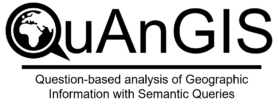Processing geo-analytical questions like Alexa
 Processing geo-analytical questions like Alexa
Processing geo-analytical questions like Alexa
This website reports about the ERC funded research project “Question-based analysis of Geographic Information with Semantic Queries (QuAnGIS)“.
Human mobility, social inequality, personal health: in the age of big data, geographic information has become a central means for data scientists of various disciplines. However, the variety of data sources and tools available on the web increases and therefore it becomes increasingly difficult to comprehend and utilise all sources available to answer geo-analytical questions.
Understanding geoanalytical questions
There are systems though that could make this task comparatively simple. Consider how easy it is for a user of a digital smartphone assistant such as Amazon’s Alexa to ask a question like “What is the weather today?” and get back an answer from a weather database on the web.
Unfortunately, this is currently not possible with arbitrary analytical tools and data, due to the lack of technology that can handle and ‘understand’ analytical questions.
Processing questions when analysing spatial data
To solve this problem it is necessary to understand how analytic resources can be described with the questions they answer. Within the project, we aim to develop a novel theory of interrogative spatial concepts to turn geo-analytical questions into a machine-readable form using semantic queries. Or in plain language: teaching analytical systems to process full sentenced questions . In this form, questions can directly be matched with the capacity of major analytic GIS tools and data on the web.
Theoretical and computational foundations
With this project we want to lay the theoretical as well as computational foundations for a Semantic Web based GIS infrastructure. This allows analysts to search for appropriate data and tools on the Web, simply by formulating an analytical question, and to load the required resources to answer this question directly from the web into a GIS.


